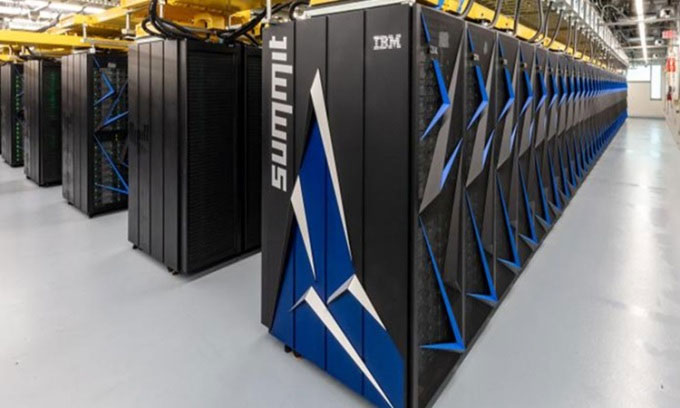Top 7 fastest supercomputers on the planet
Below are the 3 fastest supercomputers that humans have.
Supercomputers or supercomputers are High Performance Computers (HPC) - high performance computers, with outstanding computing capabilities, far beyond what you can think. They "plow" hard at universities, laboratories and other large, important facilities around the world.
Supercomputers play an important role in the field of computational science, and are used for a variety of complex computational tasks in many fields, including quantum mechanics, weather forecasting, and research. climate research, oil and gas exploration, molecular modeling (calculating the structures and properties of chemical compounds, biological macromolecules, polymers, crystals), and physical simulations (such as simulate the early moments of the universe, aerodynamics of aircraft and spacecraft). Throughout their history, supercomputers have proven important in the field of cryptanalysis.
Below are the 7 fastest supercomputers that humans have.
7. Leonardo
This computer is located at the CINECA Data Center - Bologna, Italy. Capacity: 239 petaFLOPS (0.23 exaFLOPS) Leonardo first operation: November 2022.
As another system in the EU's EuroHPC supercomputer program, Leonardo includes three modules combined to create Europe's second fastest machine. The organization that manages the machine, CINECA, is a coalition of Italian universities, research centers and government agencies. This supercomputer enters the pre-production phase in May 2023 and goes into production in August of the same year.
6. Summit

Summit supercomputer. (Photo: IBM).
Oak Ridge National Laboratory - Tennessee, USA owns the Summit supercomputer. Machine capacity: 149 petaFLOPS (0.15 exaFLOPS), first operation: June 2018.
Developed for use at Oak Ridge National Laboratory, Summit is eight times more powerful than the institute's previous supercomputer, Titan, and was the world's most powerful supercomputer for two years before being replaced by Fugaku. In addition to scientific modeling, Summit is optimized for AI-related work including machine learning and deep learning in many fields such as healthcare and materials discovery.
This supercomputer has played a key role in research for many years. For example, the machine was used to review millions of drugs during the Covid-19 pandemic to identify drugs that could prevent the virus from entering or replicating in human cells. It is also used to model turbulence.
5. Eagle
Microsoft Azure owns the Eagle supercomputer. Machine capacity: 561 petaFLOPS (0.56 exaFLOPS), first operation: August 2023.
Microsoft's Eagle supercomputer is not located in a laboratory but relies on cloud technology, and anyone can access it through the Microsoft Azure cloud platform. This is a distributed network of systems with enough collective capacity to be the third fastest supercomputer in the world.
4. Aurora
Located at the Argonne National Laboratory - Illinois, USA, Aurora has a capacity of: 585 petaFLOPS (0.59 exaFLOPS). First operation: June 2023.
One of the youngest supercomputers on the list could become the most powerful in the future. Located at the Argonne Premier Computing Facility (ALCF), Aurora becomes the second exascale supercomputer built. ALCF representatives say it has the potential to reach 2 exaFLOPS of computing power, twice that of Frontier.
The result of a partnership between Intel and HPE, Aurora integrates scientific tools and analysis, performing modeling, simulation, and running artificial intelligence (AI). Aurora's power allows it to create accurate models in many areas, including climate prediction, materials science, energy storage and fusion reactions. Fusion reactions, in particular, are central to Aurora.
3. LUMI, Finland

LUMI (Large Unified Modern Infrastructure) was built by HPE in 2022 and located in Finland, becoming the fastest supercomputer in Europe. LUMI has a total of 1,110,144 cores and clocks at 151.9 PFLOPS.
LUMI runs on the same processor as Frontier (US) and has an energy efficiency rating of 51.63 gigaflops/watt, making it the second most efficient supercomputer in the world.
2. Fugaku, Japan

Built by Fujitsu, Fugaku is installed at the RIKEN Center for Computer Science (R-CCS) in Kobe, Japan. With the additional hardware, the system achieved a new world record with a result of 442 petaflops on HPL, 3 times more than the second system on the list.
RIKEN's director, Satoshi Matsuoka, said that it was 'finally possible to use the entire machine instead of just a small part of it'.
1. Frontier, USA

Frontier was built in 2022 by American multinational information technology company Hewlett Packard Enterprise, in collaboration with subsidiary Cray. This is the world's first exascale supercomputer, which means it can calculate at least 10^18 calculations per second.
Frontier has a total of 8,730,112 cores and achieved 1.1 EFLOPS (or exaflops) in Linpack benchmark tests. It is based on the latest HPE Cray EX235a architecture and uses a combination of 64-core 2GHz 3rd generation CPU 7A53s and AMD's MI250X GPU.
Frontier is also the most efficient supercomputer in the world, with an energy efficiency rating of 52.23 gigaflops/watt. Each of its 74 computing cabinets weighs about 3.63 tons and the entire system has a total cost of up to 600 million USD.
- 2 US representatives topped the list of the world's fastest supercomputers
- IBM dominates the list of Top 500 supercomputers
- Detect creatures with the fastest eyes on the planet
- The hottest and fastest planet
- Which animal is the fastest on the planet?
- IBM created the world's fastest supercomputer
- The fastest supercomputer in the world is coming
- IBM BlueGene leads the Top 500 supercomputers
- The secret of the fastest runners of the planet
- China leads the top 500 most powerful supercomputers in the world
- Marvel at the evidence of the existence of dark matter
- Why is the cheetah the fastest animal on the planet?
 What is the Snapdragon SiP chip?
What is the Snapdragon SiP chip? How to create a yellow circle around the mouse cursor on Windows
How to create a yellow circle around the mouse cursor on Windows Edit the Boot.ini file in Windows XP
Edit the Boot.ini file in Windows XP 3 ways to restart the remote computer via the Internet
3 ways to restart the remote computer via the Internet